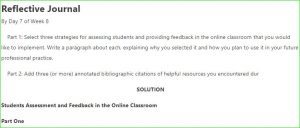Reflective Journal Essay Sample

By Day 7 of Week 8
Part 1: Select three strategies for assessing students and providing feedback in the online classroom that you would like to implement. Write a paragraph about each, explaining why you selected it and how you plan to use it in your future professional practice.
Part 2: Add three (or more) annotated bibliographic citations of helpful resources you encountered due
ORDER AN ORIGINAL REFLECTIVE JOURNAL WITH NURSING ASSIGNMENTS EXPERTS TODAY !
SOLUTION
Students Assessment and Feedback in the Online Classroom
Part One
Assessment of online students and obtaining feedback about their learning experience is one of the essential aspects of active online learning and teaching. Assessment needs to be done regularly, and therefore, it needs to be as practical and straightforward as possible.
One of the most important goals in education, whether in the traditional or online classroom is understanding and acquisition of knowledge (Flores, Veiga Simão, Barros & Pereira, 2015). Therefore, the assessment of students is equally crucial as the delivery of the educational content.
Three of the most effective strategies that I would like to implement in the evaluation of students in the online classroom are a response to a video, presentation, and field experience.
Response to a video is one of the most effective methods of assessing students. This method also helps the instructor to get feedback concerning the student’s information retention rate. Under this method of assessment, online learners watch a documentary or an informative video and respond to analysis questions (Suen, 2014).
Students always enjoy watching videos, and this can help them to gain even more enthusiasm for learning. Response to a video helps the student to connect with the educational materials more emotionally that it would happen in reading materials. I plan to use this method in the future online classroom since it helps the students to retain more information.
Field experience entails students taking some practical field activity that is related to their course. This method is chosen as a practical approach to assess and get feedback from the online classroom students.
The field experience helps the students to remember what was taught in class by relating it with what they observed in the field (Hwang, Lai & Wang, 2015). Preparation of reports after the field experience helps the educator to assess the information and knowledge retention among the students.
Finally, media presentation is a method of assessment that helps the instructor to gauge the level of understanding of a learner (Suen, 2014). When the student presents the PowerPoint slides, the instructor can assess the knowledge retained by the learner. I plan to implement this method in my future online classroom for the assessment of my students.
Part Two: Annotated Bibliography
Flores, M. A., Veiga Simão, A. M., Barros, A., & Pereira, D. (2015). Perceptions of effectiveness, fairness, and feedback of assessment methods: a study in higher education. Studies in Higher Education, 40(9), 1523-1534.
This article focuses on the learner’s perception of fairness, feedback, and effectiveness of assessment methods. Findings show that the most effective assessment approaches are oral presentations as well as a written test. The article relates to his study in the sense that online learning requires regular and practical assessment.
Hwang, G. J., Lai, C. L., & Wang, S. Y. (2015). Seamless flipped learning: a mobile technology-enhanced flipped classroom with active learning strategies. Journal of computers in education, 2(4), 449-473.
The authors of the article suggest that flipped learning is one of the practical learning strategies. Flipped learning is described as an effective and innovative instructional approach for teaching online students. The relationship between the article and my area of research is that the article highlights how the instructors can get feedback from their students using the flipped classroom approach.
Suen, H. K. (2014). Peer assessment for massive open online courses (MOOCs). The International Review of Research in Open and Distributed Learning, 15(3).
The article highlights that the most massive open online course (MOOCs) do not have the teach-learn-assess cycle. However, many available methods provide credible feedback to online instructors. Online paired discussion forums can help to augment the evaluation of the learner.
References
Flores, M. A., Veiga Simão, A. M., Barros, A., & Pereira, D. (2015). Perceptions of effectiveness, fairness, and feedback of assessment methods: a study in higher education. Studies in Higher Education, 40(9), 1523-1534.
Hwang, G. J., Lai, C. L., & Wang, S. Y. (2015). Seamless flipped learning: a mobile technology-enhanced flipped classroom with effective learning strategies. Journal of computers in education, 2(4), 449-473.
Suen, H. K. (2014). Peer assessment for massive open online courses (MOOCs). The International Review of Research in Open and Distributed Learning, 15(3).
Also check: Peer Collaboration Week
